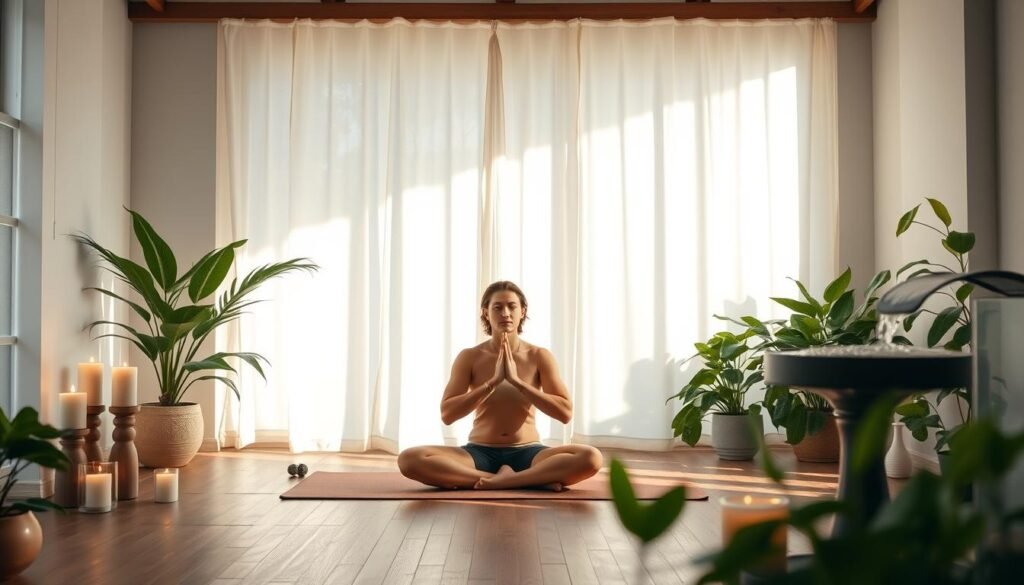About 20% of adults will face anxiety disorders during their life. This shows how common anxiety is, sometimes popping up without a clear reason. Many find themselves battling anxiety without knowing why, leaving them feeling lost and stressed. It’s key to understand this kind of anxiety because it can really affect how you live your day-to-day life.
It’s important to know that anxiety doesn’t always come from an obvious place. This type of anxiety might show itself through physical signs, mental stress, or big changes in how someone acts. Dealing with these feelings properly is crucial for not just your mind, but your heart too. Soon, we’ll look at ways to handle these feelings and find some peace.
Key Takeaways
- Anxiety affects a significant portion of the population.
- Unexplained anxiety can manifest in various ways including physical and mental symptoms.
- Effective strategies for anxiety can lead to improved daily functioning.
- Understanding the triggers can help in managing random anxiety.
- Seeking help from professionals is important for those affected.
Understanding Anxiety: A Common Experience
Anxiety is something a lot of people feel in their day-to-day life. It’s how we naturally react to stress like giving a speech or facing changes. About 20% of American adults deal with anxiety disorders every year. This highlights how important it is to pay attention to mental health awareness. While some anxiety is normal, constant anxiety could be a sign of something more serious.
There are different forms of anxiety. For example, 15 million U.S. adults have social anxiety disorder. Nearly 7 million have generalized anxiety disorder. These conditions are more severe than normal stress reactions. They last longer and can make people feel very worried or afraid. Without treatment, anxiety disorders can lead to depression and drug use, affecting life’s quality.
It’s important to recognize the difference between occasional and serious anxiety. Many people try to avoid situations to lessen their anxiety. But this can make their fear and worry worse. mental health awareness is key. It helps people know when to seek help.
About 31.1% of U.S. adults experience an anxiety disorder at some point. Sharing these facts helps people realize they are not alone. It encourages open talks about mental health awareness.
| Type of Anxiety Disorder | Estimated Number of Affected Adults (U.S.) | Lifetime Prevalence |
|---|---|---|
| Social Anxiety Disorder | 15 million | 12.1% |
| Generalized Anxiety Disorder | 7 million | 3.1% |
| Panic Disorder | 6 million | 2-3% |
| Agoraphobia | Approximately 1.7% | N/A |
| Specific Phobias | 7-9% | N/A |
We can help reduce stigma by understanding and supporting people with anxiety disorders. Knowing the difference between common anxiety and a disorder is important. It leads to the right support and treatment.
What is Anxiety for No Reason?
Anxiety for no reason can come on suddenly, leaving people feeling confused and worried. It’s known as spontaneous or unprovoked anxiety. It happens without a clear cause, making individuals anxious in ordinary situations where there’s no apparent reason to be.
Finding oneself distressed by this can be puzzling. It’s as if the body sees a threat when there is none. People might feel overwhelmed and lost, unable to find a reason for their anxiety.

Knowing the symptoms of this condition is key. It often includes physical signs like heart racing or fast breathing. These symptoms can make the anxiety feel even more intense. Knowing that anxiety for no reason is a recognized issue helps. It reduces stigma and encourages people to get support.
It’s important to understand that anxiety can strike out of nowhere. Once people know this, they can start looking for ways to handle their feelings. Exploring different coping methods is a good step.
Symptoms of Unexplained Anxiety
It’s key to know the signs of anxiety when they appear out of the blue. There are physical, mental, and behavior-related symptoms. Each type helps us see how anxiety affects people, showing why it’s essential to watch for and understand these signs.
Physical Symptoms
Physical signs of anxiety can seem scary and resemble other health issues. Some common ones are:
- Racing heartbeat
- Dizziness
- Excessive sweating
- Nausea
- Chest pain or tightness
These symptoms might look like other serious problems. For example, panic attacks can feel like heart attacks. It’s important to know the difference.
Mental Symptoms
The mental effects of anxiety differ a lot among people. Some common mental signs are:
- Racing thoughts
- Feelings of impending doom
- Heightened awareness of surroundings
- Difficulty concentrating
- Increased irritability
These issues can disrupt everyday life. They might overwhelm people and lower their quality of life.
Changes in Behavior
With anxiety, people often change how they act. Look out for these behaviors:
- Avoidance of social situations
- Increased dependence on others
- Disruptions in daily life
- Changes in sleep patterns
Spotting these shifts in behavior can point to anxiety in oneself or others. This helps foster understanding and support.

| Symptom Category | Examples |
|---|---|
| Physical Symptoms | Racing heartbeat, dizziness, sweating, nausea |
| Mental Symptoms | Racing thoughts, feelings of doom, irritability |
| Behavioral Changes | Avoidance, disruptions in daily activities, altered sleep |
Causes of Sudden Anxiety
Knowing why anxiety starts shows us how life challenges can cause sudden anxiety. Things like work trouble, money worries, and issues in relationships can lead to anxiety. Nowadays, many people feel more anxious than before. In fact, 43% of American adults are more stressed in 2024 than they were earlier. This shows how common stress-induced anxiety is today.
Life Circumstances and Stress
Anxiety often comes from what happens in our lives. Small daily stressors, like being stuck in traffic or having a tough job, can make anxiety worse. Money worries also add a lot of stress for many people. For example, 77% of adults are concerned about the economy, which affects their anxiety. Chronic stress, which lasts a long time, can make anxiety disorders even more severe. It’s important to note some people might be more likely to get anxious, especially if their family has a history of it.
Panic Attacks: Recognizing The Signs
Panic attacks suddenly overwhelm people with fear, including physical reactions like struggling to breathe or chest pain. These attacks can stop someone from doing their everyday activities and can happen unexpectedly. A study in 2022 found that drinking too much caffeine, such as five cups of coffee, can make you more anxious, leading to panic attacks in some people. Knowing the signs of panic attacks helps in dealing with them faster. Getting help from a doctor can uncover any health issues causing the anxiety, leading to better treatment strategies. This includes checking for hidden medical.
Effective Strategies to Manage Random Anxiety
Random anxiety can surprise anyone, coming from many sources. It’s important to find good ways to handle it for our emotional health. Talking openly about our feelings is key to building strong, supportive ties.
Sharing what we go through brings us closer to others. It makes us feel understood and supported in dealing with anxiety.
Talking About Your Feelings
Talking to people you trust can really lighten the load of anxiety. It makes you feel less alone. These chats can give new viewpoints and might even bring helpful advice or someone to simply listen. To get better at discussing anxiety, check out more information here.
Practicing Calming Techniques
Using calming methods daily can make anxiety easier to handle. Deep breathing, being mindful, and exercising are great at easing anxiety. For instance, a quick walk can calm you down fast. Studies show regular physical activity helps with anxiety, suggesting it three to five times a week for mental wellness.
Other methods like meditation and writing a journal help find triggers. Look into these for more insights.

| Calming Technique | Benefits | Frequency |
|---|---|---|
| Deep Breathing | Reduces physiological symptoms of anxiety | As needed |
| Mindfulness | Increases awareness and reduces stress | Daily recommended |
| Physical Activity | Improves mood and decreases anxiety | 3-5 times a week |
| Journaling | Identifies triggers and enhances emotional clarity | Weekly or as needed |
Realizing that managing anxiety is an ongoing process helps in using these strategies well. Putting these tips into action can manage anxiety better. And it leads to a healthier, more balanced life.
When to Seek Professional Help for Causeless Anxiety
Knowing when to get help for anxiety is key. It can greatly affect how you manage anxiety that lasts a long time. If your anxiety messes with your day-to-day life, it’s time to think about how you feel and act. Signs that you should see a therapist include panic attacks, constant worrying, or if you can’t concentrate. These symptoms mean you might need help right away.
Identifying Long-Lasting Symptoms
Anxiety that won’t go away affects both your mind and body. There are certain signs that show you might need expert help.
- Frequent panic attacks: Scary moments of fear that show up in your body as a fast heartbeat and breathing hard.
- Consistent worry: When you can’t stop feeling nervous about many things, even without a clear reason.
- Disruption in daily activities: When anxiety makes it hard to get through your daily tasks.
- Physical symptoms: When you start to see things like tense muscles, feeling sick, and stomach problems that affect how you feel overall.
It’s critical to think about your own experiences and get professional help if you see any of these signs. Getting help can really improve how you deal with anxiety and help you manage it better. For more tips on spotting anxiety signs, check out this site.
Support Systems for Those Experiencing Unprovoked Anxiety
Building support networks is key for those facing anxiety without a clear cause. It helps to talk to others who understand, making one feel less alone. There are many ways to find support, from talking with friends to seeking professional help.
Peer Support and Counseling Options
Peer support lets people share their journey and tips for managing anxiety. Students, for example, often rely on peers when they feel anxious. Finding comfort in others’ similar experiences can be very powerful.
Seeking professional help is another important step. Counselors provide personalized strategies to deal with anxiety. They, along with support groups, create a structured space for healing that many find helpful.
| Support Type | Description | Availability |
|---|---|---|
| Peer Support Groups | Informal gatherings for individuals to share experiences and offer mutual support. | Weekly at local community centers. |
| Professional Counseling | Individual sessions with licensed counselors to address specific anxiety issues. | By appointment at various clinics. |
| Hotlines | 24/7 access to trained professionals for immediate support. | Available nationwide through various mental health organizations. |
Knowing about different support options can empower someone to seek the help they need. Connecting with peers or professionals who understand can boost resilience and overall well-being.
Conclusion
Many adults in the U.S. are dealing with unexplained anxiety. About 40 million, to be precise. It’s vital to know that this kind of anxiety can really affect your daily life and overall health. Every year, up to 30% of adults struggle with it.
There are ways to tackle this anxiety and improve your life. Setting aside a specific time to worry can cut down your anxiety by half. By changing the way you think about your worries, you can do much better every day. It’s about learning how to deal with tough situations and finding inner strength.
Getting help is often necessary and very helpful. Sadly, only about 37% of those with anxiety get the help they need. Finding the right support, whether it’s therapy, changing your lifestyle, or leaning on friends, can change your life for the better.